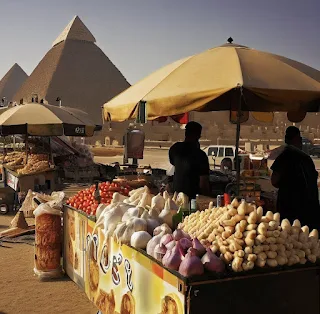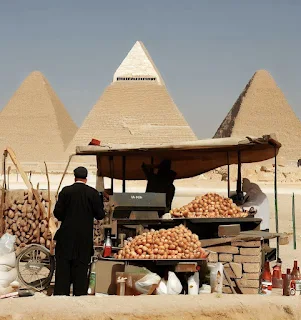Origins of African Street Food: From Ancient Egypt to Modern-Day Mobile Food Stalls
The Origins of Street Food in Africa: A Culinary Tradition Rooted in Ancient Egypt
Street food in Africa dates back to ancient times, with roots tracing back to laborers building the pyramids of Giza. These workers relied on street vendors for nourishment, consuming simple yet vital foods like bread, onions, garlic, and beer. The ancient Egyptian diet of pyramid workers consisted of freshly baked bread made from wheat and barley, providing them with essential carbohydrates for their physically demanding tasks.
The role of street vendors in ancient Egypt was pivotal in supporting these workers with affordable and nutritious meals. Alongside bread, onions and garlic added flavor and nutritional value, while beer—a key part of the ancient Egyptian diet—helped quench the workers' thirst and replenish their energy.
The Influence of Islam and the Trans-Saharan Trade
The spread of Islam across North Africa introduced new ingredients like couscous, dried fruits, and nuts. The trans-Saharan trade further diversified the street food offerings, facilitating the exchange of spices, grains, and meat. This cultural exchange contributed to the development of today’s diverse street food culture across the continent.
European Colonization and the Impact on Street Food
European colonization in the 15th century brought new crops such as maize, cassava, and tomatoes, which became staples in many African street food dishes. In West Africa, fried bean cakes (akara) and puff-puff (fried dough balls) are made using cassava and maize flour, while East Africa’s chapati and samosa reflect Indian culinary influences.
Mobile Food Stalls: A Modern Evolution of Street Food in Africa
Today, mobile food stalls are an integral part of African street food culture. These portable units—commonly known as food carts or food trucks—offer entrepreneurs the chance to innovate and share their culinary talents. Mobile food stalls serve a variety of dishes and provide affordable meals, fostering accessibility in areas with limited access to restaurants.
Compared to traditional brick-and-mortar restaurants, mobile food stalls offer lower operational costs, making them an ideal business model for aspiring chefs. Their flexibility also allows them to reach underserved communities, where food options are often scarce.
Popular Street Foods Across Africa
- Jollof Rice: A flavorful one-pot rice dish popular in West Africa, particularly in Nigeria, Ghana, and Senegal. Jollof rice is made with tomatoes, spices, and meat or fish.
- Bunny Chow: Originating in South Africa, this dish consists of curry served in a hollowed-out loaf of bread. It was invented during apartheid, when the use of plates was prohibited for certain communities.
- Suya: Grilled skewers of meat, typically beef or chicken, marinated in spicy peanut sauce. Suya is a favorite street food in Nigeria and West Africa.
- Mandazi: Fried doughnuts flavored with coconut milk and cardamom, common in East Africa, particularly in Kenya, Tanzania, and Uganda.
- Injera: A sourdough flatbread from Ethiopia and Eritrea, served with stews and used as both a dish and utensil.
Examples of popular street food found across Africa.
Jollof rice is a one-pot dish of rice cooked with tomatoes, onions, spices, and meat or fish. It is widely consumed in West Africa, especially in Nigeria, Ghana, and Senegal. Each country claims to have the best version of jollof rice.
Bunny chow is a hollowed-out loaf of bread filled with curry. It originated in South Africa among the Indian community during the apartheid era, when they were not allowed to use plates or cutlery in public places.
Suya are grilled skewers of meat usually beef or chicken marinated in a spicy peanut sauce. It is a popular street food in Nigeria and other parts of West Africa.
Moin Moin is a steamed cake made from blended black-eyed beans, onions, peppers, and palm oil. They are often wrapped in banana leaves or foil and sold by street vendors in Nigeria and other West African countries.
Mandazi is deep-fried doughnuts flavored with coconut milk, cardamom, and sugar. They are a common breakfast or snack item in East Africa, especially in Kenya, Tanzania, and Uganda.
Injera is a sourdough flatbread made from teff flour that is used as a staple and utensil in Ethiopian and Eritrean cuisine. It is served with various stews and salads that are placed on top of the injera and eaten by tearing pieces of it with one's fingers.
The Rich History of Street Food in Egypt
At the Egyptian pyramids, street food was an essential part of the laborers’ daily lives. Along with bread, beer, onions, and garlic, workers were fed to ensure they could withstand the physically demanding work of building the pyramids. This historical connection between food and labor underscores the cultural and nutritional significance of street food in ancient Egypt.
Mobile Food Stalls: An Economic Boon in Africa
Today’s street food vendors contribute to local economies, offering affordable meals and promoting entrepreneurship. Mobile food stalls are often run by small business owners, providing income opportunities and supporting communities in both urban and rural areas.
African street food is more than just a meal—it’s a cultural experience that has evolved over centuries. From the ancient Egyptian pyramid workers to modern-day mobile food stalls, street food reflects Africa’s rich history and diversity. Whether enjoying a plate of Jollof rice, savoring grilled Suya, or nibbling on a Mandazi, African street food continues to bring people together, offering a taste of tradition, innovation, and culture.































